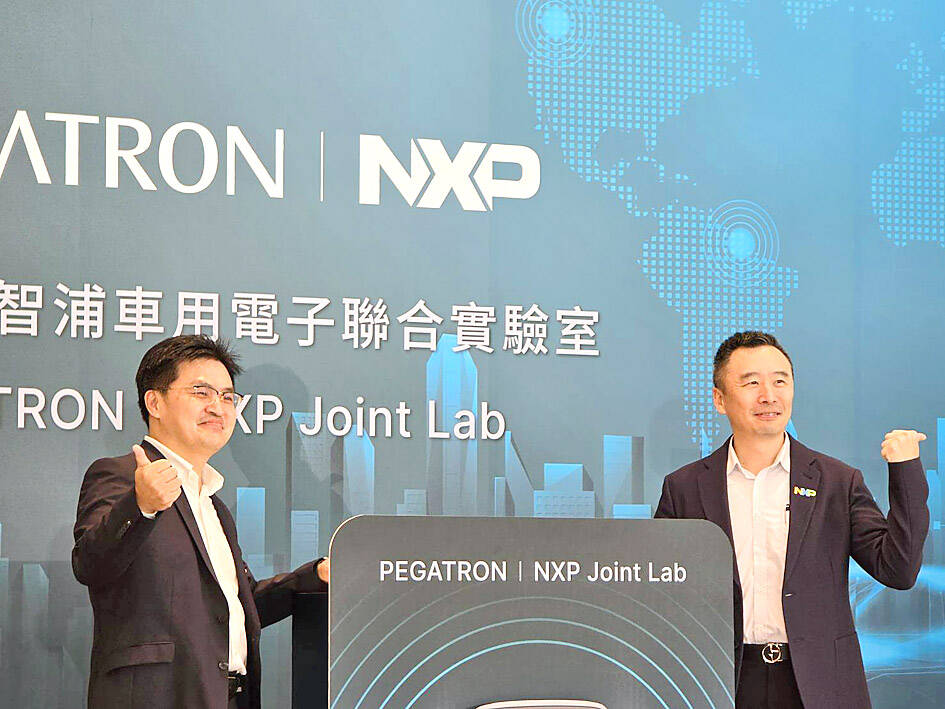Pegatron Corp (和碩) yesterday launched a laboratory in Taipei in partnership with NXP Semiconductor NV for the verification of electric vehicle (EV) applications such as smart cockpits.
New products designed for customers are already undergoing the verification process at the laboratory, which is equipped with machines worth more than NT$10 million (US$308,499), the company said, adding that its new smart cockpit solutions utilize NXP’s electrification portfolio and cross-vehicle system solutions.
The new lab is the third joint collaboration between NXP and its partners in Taiwan, which include Hon Hai Precision Industry Co (鴻海精密) and Delta Electronics Co (台達電).

Photo: CNA
“We are bullish about the automotive market,” Gary Cheng (鄭志光), President & CEO at Pegatron, said on the sidelines of the launch ceremony in Taipei’s Beitou District (北投).
“The global auto industry is expected to increase to US$4 trillion to US$6 trillion in 2033, which presents good business opportunities for Taiwan’s electronics industry, and Pegatron as well,” Cheng said.
Pegatron is keen to supply auto applications to automakers in the US, Europe and Japan and to emerging start-ups, he added.
Meanwhile, Pegatron said it is prepared to set up a new European manufacturing base in the Czech Republic, if it secures new orders.
The firm already operates large-scale manufacturing sites in Taoyuan, Mexico and Suzhou, China, to produce verified auto products.
Pegatron said its strength lies in computing-related applications such as gateway, telematics and advanced driver-assistance systems, coupled with its experience in making consumer electronics and communications devices.
The US and EU are poised to levy heavy tariffs on Chinese electric vehicle imports to protect their auto industries, which might provide good business opportunities for local companies given Taiwan’s strategic position, Cheng said.
Pegatron said it aims to boost revenue from auto products to 10 percent of its total revenue next year.

Sweeping policy changes under US Secretary of Health and Human Services Robert F. Kennedy Jr are having a chilling effect on vaccine makers as anti-vaccine rhetoric has turned into concrete changes in inoculation schedules and recommendations, investors and executives said. The administration of US President Donald Trump has in the past year upended vaccine recommendations, with the country last month ending its longstanding guidance that all children receive inoculations against flu, hepatitis A and other diseases. The unprecedented changes have led to diminished vaccine usage, hurt the investment case for some biotechs, and created a drag that would likely dent revenues and

Global semiconductor stocks advanced yesterday, as comments by Nvidia Corp chief executive officer Jensen Huang (黃仁勳) at Davos, Switzerland, helped reinforce investor enthusiasm for artificial intelligence (AI). Samsung Electronics Co gained as much as 5 percent to an all-time high, helping drive South Korea’s benchmark KOSPI above 5,000 for the first time. That came after the Philadelphia Semiconductor Index rose more than 3 percent to a fresh record on Wednesday, with a boost from Nvidia. The gains came amid broad risk-on trade after US President Donald Trump withdrew his threat of tariffs on some European nations over backing for Greenland. Huang further

Macronix International Co (旺宏), the world’s biggest NOR flash memory supplier, yesterday said it would spend NT$22 billion (US$699.1 million) on capacity expansion this year to increase its production of mid-to-low-density memory chips as the world’s major memorychip suppliers are phasing out the market. The company said its planned capital expenditures are about 11 times higher than the NT$1.8 billion it spent on new facilities and equipment last year. A majority of this year’s outlay would be allocated to step up capacity of multi-level cell (MLC) NAND flash memory chips, which are used in embedded multimedia cards (eMMC), a managed

CULPRITS: Factors that affected the slip included falling global crude oil prices, wait-and-see consumer attitudes due to US tariffs and a different Lunar New Year holiday schedule Taiwan’s retail sales ended a nine-year growth streak last year, slipping 0.2 percent from a year earlier as uncertainty over US tariff policies affected demand for durable goods, data released on Friday by the Ministry of Economic Affairs showed. Last year’s retail sales totaled NT$4.84 trillion (US$153.27 billion), down about NT$9.5 billion, or 0.2 percent, from 2024. Despite the decline, the figure was still the second-highest annual sales total on record. Ministry statistics department deputy head Chen Yu-fang (陳玉芳) said sales of cars, motorcycles and related products, which accounted for 17.4 percent of total retail rales last year, fell NT$68.1 billion, or